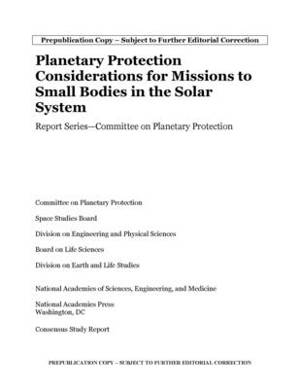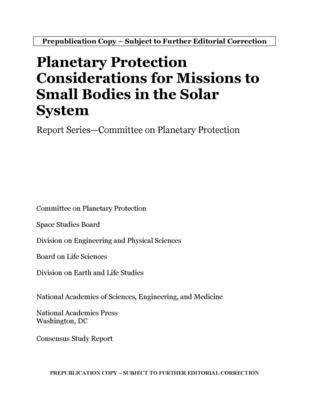
- Retrait gratuit dans votre magasin Club
- 7.000.000 titres dans notre catalogue
- Payer en toute sécurité
- Toujours un magasin près de chez vous
- Retrait gratuit dans votre magasin Club
- 7.000.0000 titres dans notre catalogue
- Payer en toute sécurité
- Toujours un magasin près de chez vous
Planetary Protection Considerations for Missions to Solar System Small Bodies
Report Series--Committee on Planetary Protection
National Academies of Sciences Engineering and Medicine, Division on Earth and Life Studies, Division on Engineering and Physical Sciences, Board on Life Sciences, Space Studies Board, Committee on Planetary ProtectionDescription
The ultimate goal of planetary protection for outbound missions is to prevent harmful contamination that would inhibit future measurements designed to search for evidence of the existence or evolution of extraterrestrial life. Preventing harmful contamination is achieved by following specific guidelines based on existing scientific knowledge about the destination and the type of mission. This report responds to NASA's request for a study on planetary protection categorization of missions to small bodies, including whether there are particular populations of small bodies for which contamination of one object in the population would not be likely to have a tangible effect on the opportunities for scientific investigation using other objects in the population. In addressing NASA's request, the authoring committee considered surface composition of target bodies and their importance for prebiotic chemistry, along with size of the small-body populations, the current state of knowledge on the types of objects, the likelihood of a future scientific mission returning to any specific object, active object surface processes, and the size.
Spécifications
Parties prenantes
- Auteur(s) :
- Editeur:
Contenu
- Nombre de pages :
- 64
- Langue:
- Anglais
Caractéristiques
- EAN:
- 9780309693721
- Date de parution :
- 11-08-23
- Format:
- Livre broché
- Format numérique:
- Trade paperback (VS)
- Dimensions :
- 216 mm x 279 mm

Les avis
Nous publions uniquement les avis qui respectent les conditions requises. Consultez nos conditions pour les avis.






